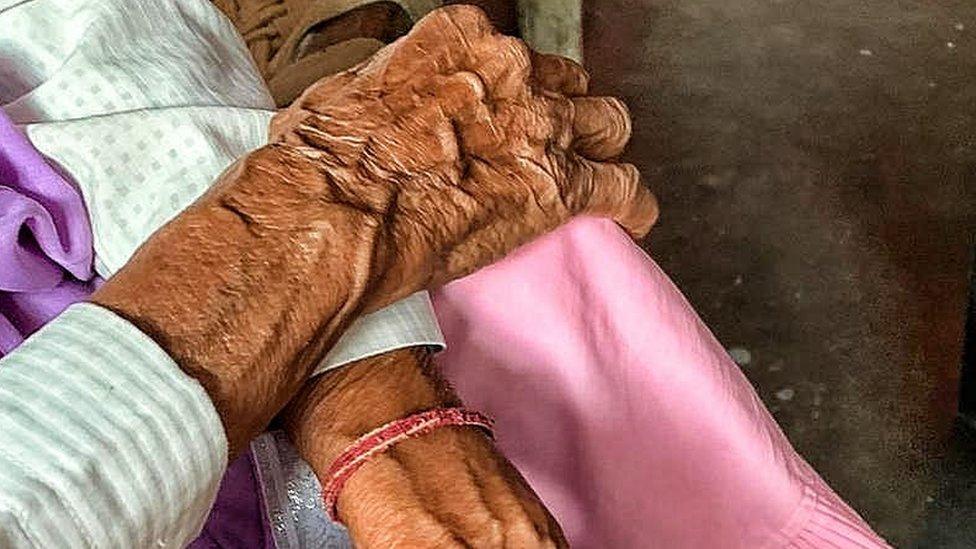Hathras case: A fatal assault, a cremation and no goodbye
- Published
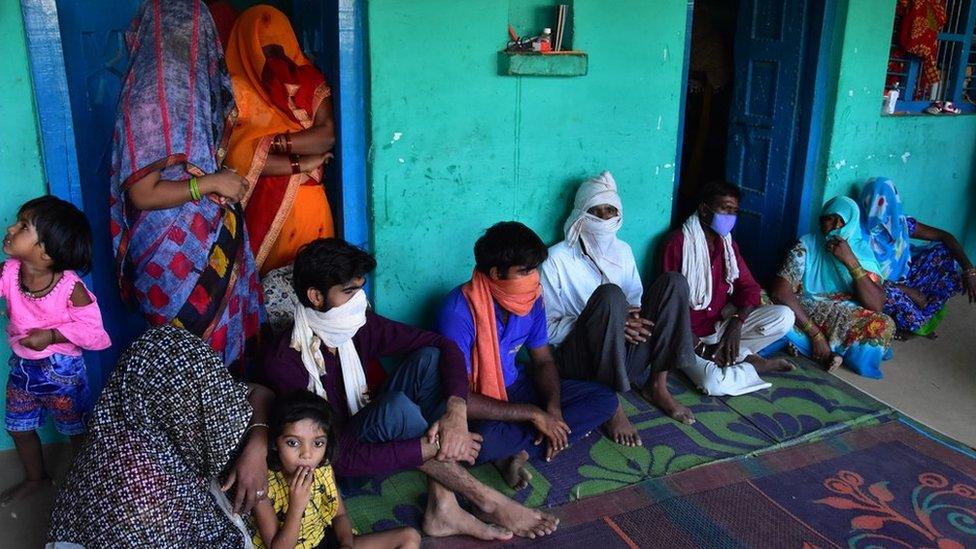
The 19-year-old's family are still trying to come to terms with their loss
On the last day of September, India woke up to the disturbing news that authorities had forcibly cremated the body of a 19-year-old Dalit (formerly untouchable) woman who had alleged gang rape and died a day earlier.
The news caused global outrage, leading to accusations that the young woman - who was allegedly raped by four upper-caste men and had fought for her life for two weeks - was treated as shabbily in death as in life.
The police in Hathras district in Uttar Pradesh state, where the attack took place, said the family had consented to her cremation.
But her family and local journalists, who were present in the village when her funeral pyre was lit at around 2:30am, have contested the claim in interviews with the BBC.
I travelled to Bhulgarhi village in Hathras district to find out what exactly happened on the night of 29 September.
What emerges is a story of an unequal balance of power between the might of the state and some of its most disadvantaged citizens, officials' disregard for protocol, and their seeming unconcern for a grieving family trying to come to terms with a tragedy.
Where's the body?
"My sister died at 6:55am on Tuesday [29 September] in Delhi's Safdarjung hospital. Around 9am, they asked us to sign some papers so the body could be taken for a post-mortem," says the victim's younger brother.
"That was the last time we saw her body," he adds as we sit chatting on the floor, our backs to the wall in the outer area of his home. The courtyard is overrun with dozens of journalists and politicians of all hues, who are visiting the family one by one to offer condolences.
The victim's brother, his father and two other male relatives had accompanied the victim when she was moved a day before her death to Delhi from the hospital in Aligarh city where she had been treated since 14 September - the day she was attacked.
A few hours after her death, when they went to the forensic department to check when they could collect the body, he says they received conflicting replies from the policemen and officials.
"One said the body had already been released, another said it had reached Noida [a town on the Delhi-Uttar Pradesh border], yet another said it was in Hathras.
"I asked them how can you take the body without our permission?"
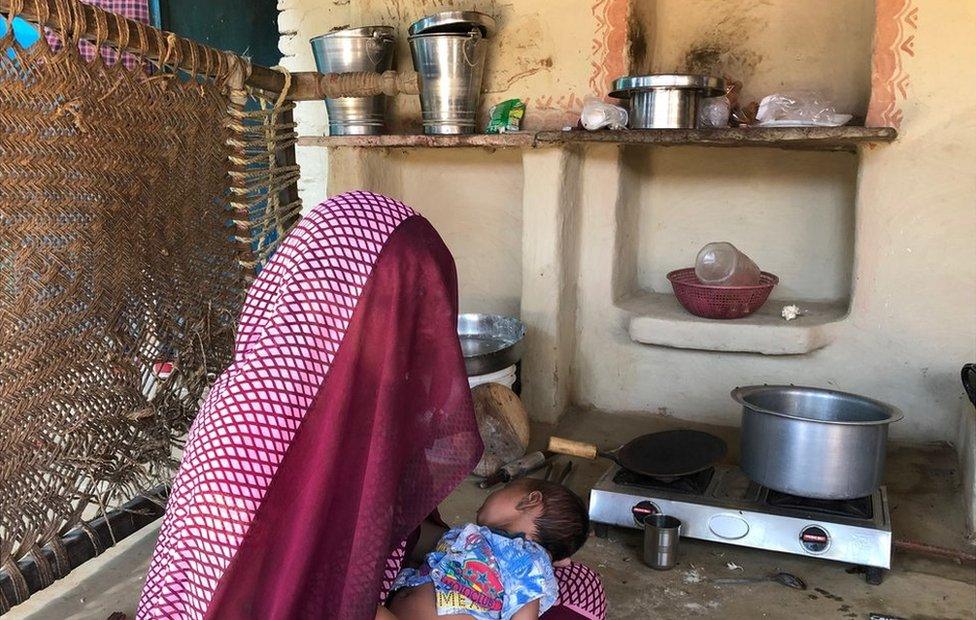
The victim's sister-in-law says she wants to see the attackers hanged
Soon, their relatives arrived and began a protest outside the hospital, demanding the body be handed over to them. They were joined by activists of the Bhim Army, a party that fights for the rights of Dalits who are at the bottom of the unforgiving Hindu caste hierarchy.
Back in the village, the family had already begun mourning.
"They called in the morning to say she had died," says the victim's sister-in-law. "They were crying on the phone. Everyone began crying here too.
"We asked when will you bring the body home?"
The drive back to the village
At around 9:30pm, the dead teenager's brother says the police forced him into a black SUV along with his father and began driving them back to their village 200km (125 miles) away.
"On the way, our car was stopped and senior police and administration officials came to talk to us. Among them was Hathras district magistrate Praveen Kumar Laxkar who told us that we would be taken directly to the cremation ground."
He says they had no idea where the body was or what time the ambulance carrying it had left the hospital.
Hathras superintendent of police Vikrant Vir told my BBC Hindi colleague Dilnawaz Pasha last week that the post-mortem was completed by 1pm.
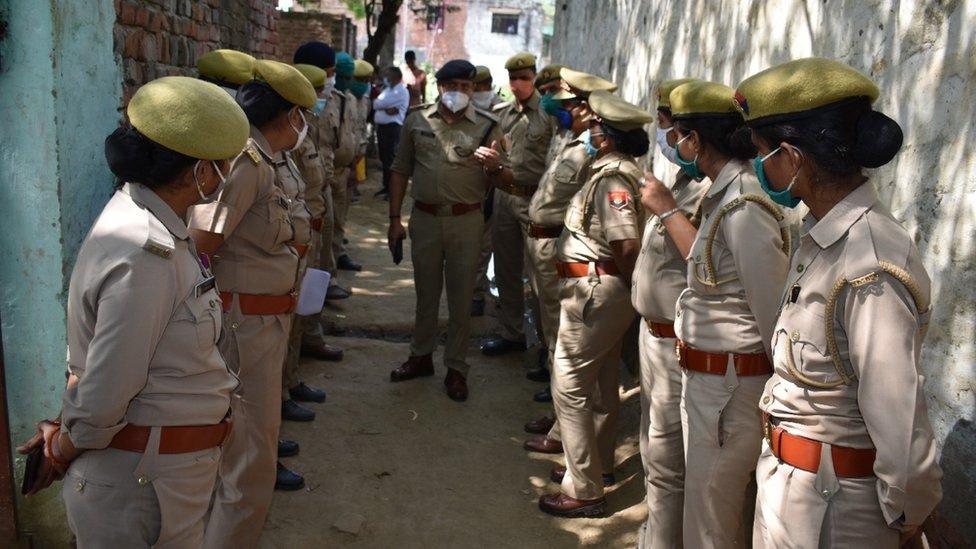
Hundreds of police are still deployed in the village and outside the victim's home
"But for some reason her body couldn't be brought back immediately. It was late night by the time the body arrived in the village. Her father and brother had travelled with the body."
Last Friday, the state government suspended Mr Vir for "negligence and lax supervision". Four other policemen were removed too. Calls have also been growing to remove the district magistrate, Mr Laxkar.
Preparations for funeral
While the family was waiting for the body to arrive, police and administration officials had already begun preparations for a late-night funeral.
"They had brought in a generator, lights were installed, logs and fuel were brought in," the teenager's sister-in-law says.
Journalists present in the village say barricades were erected on the roads leading to the family home and the dirt track that led to a small patch of the field where the funeral was to happen.
A white ambulance carrying the body arrived in the village at around midnight.
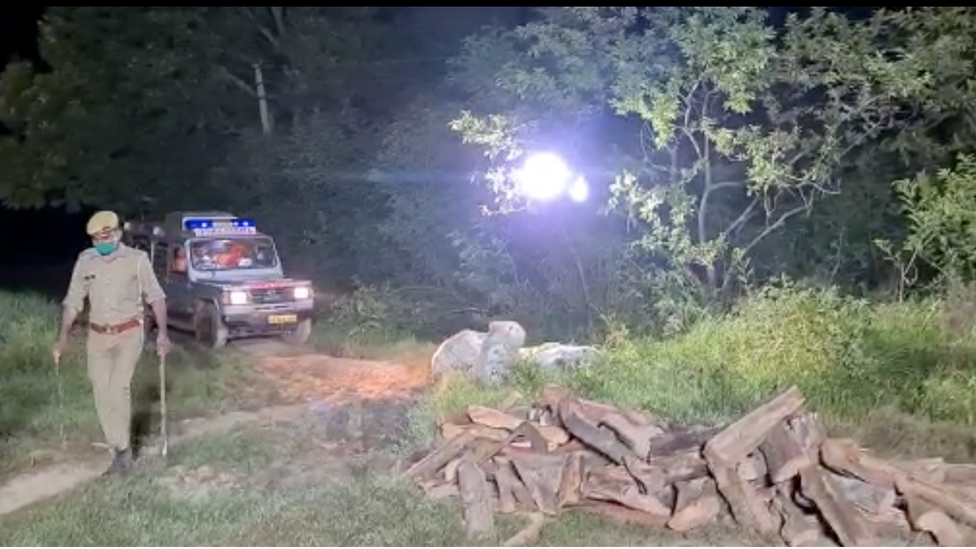
The teenager's family say the officials made preparations for a late-night funeral without their consent
"Besides the driver, there was a policeman and a policewoman in the ambulance. There was no family member in it," says the victim's aunt.
"It was parked nearby for an hour. We asked them to let us at least see her face," she tells me, tears streaming down her face.
The black SUV, carrying the victim's bother and father, reached the village at around 1am and was driven straight to the cremation ground.
Attempts to claim the body
"Hindus don't cremate at night," the brother says. "I told them we can't have the cremation without rituals and in the absence of our family. When we went home, we heard that the ambulance carrying her body had already arrived in the village."
Officials followed them home and tried to persuade them to go and light the pyre.
"The women of the family fell at their feet, begging them to hand over the body so they could perform the rituals. But they were unmoved," he says.
Videos shared widely on news TV channels and social media show the dead woman's female relatives making several attempts to claim her body.
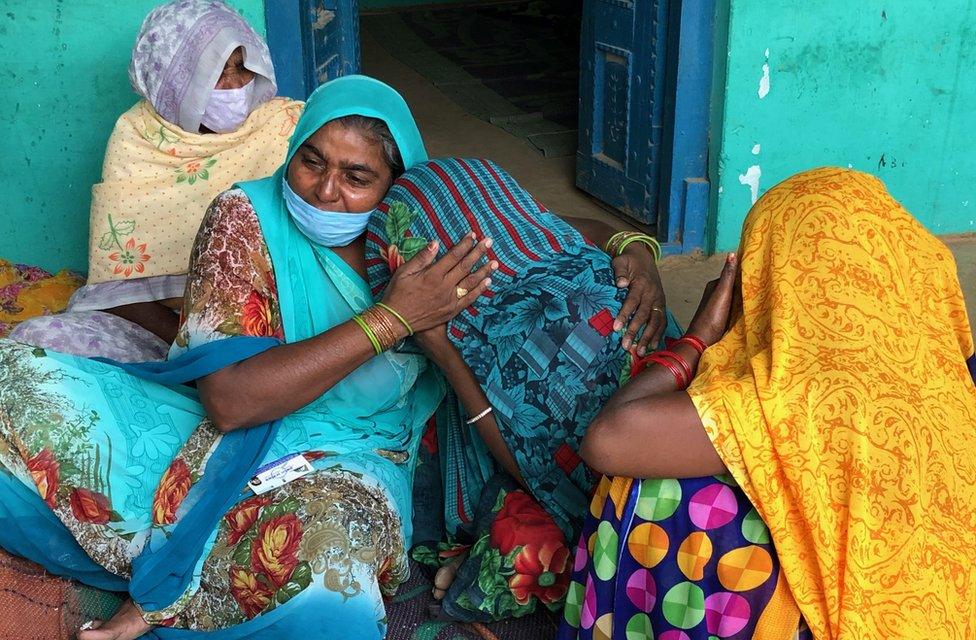
The 19-year-old's aunt consoles her mother who still can't talk about her daughter without dissolving into tears
In one video, her mother is seen weeping with her head on the bonnet of the car. In another, she's sitting on the road in front of the ambulance, wailing and beating her chest.
She's heard repeatedly pleading with officials to hand over the body to her so she could take it home one last time - and perform some rituals.
"We wanted to put turmeric and sandalwood paste on her arms and legs, dress her in new clothes, adorn her with flowers. She wouldn't have seen it, but by doing the rituals we would have been able to say a proper farewell to her," says the teenager's sister-in-law, fighting back tears.
Her aunt shows me bruises on her elbows, "They flung us aside and drove away with the body. Many of us fell down. I fell into a field."
The funeral pyre is lit
Even though the family had refused to cremate the body, the 19-year-old was still consigned to flames that night.
"We didn't want them to take us forcibly and light her pyre so we locked ourselves in," says the young woman's brother. "We had no idea what was happening outside."
Local journalists, who witnessed the cremation from a distance, said the funeral pyre was lit around 2:30am.
The police formed a human chain to keep the villagers and journalists from getting close.
"Why did the police cremate her? Was hers an unclaimed body?" her mother asks. "I carried her in my womb for nine months. Do I not have the right to see her face one last time? Do I not have the right to grieve? Do I not feel pain?"
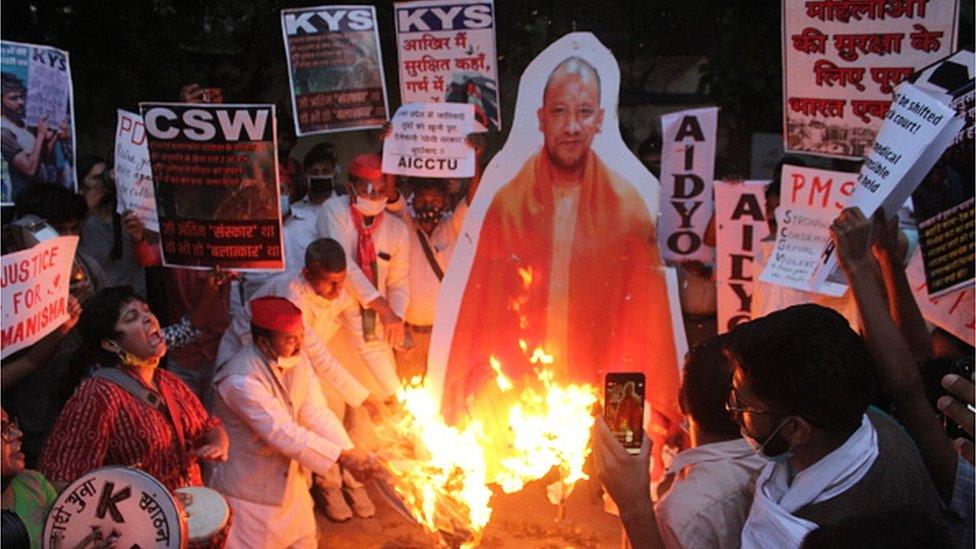
Protesters burn an effigy of Uttar Pradesh Chief Minister Yogi Adityanath
The hasty cremation has caused outrage in India and abroad. Opposition parties have called it "a gross violation of human rights", "illegal" and "immoral". Protests have been held across India and by Indians in several American cities. The UN, too, has weighed in, expressing "profound sadness and concern at the continuing cases of sexual violence against women and girls in India".
On Tuesday, the Uttar Pradesh government told the Supreme Court that they had cremated the body at night due to "extraordinary circumstances and a sequence of unlawful incidents".
They said there was an "international plot" to cause caste and religious riots in the state and topple the government of Chief Minister Yogi Adityanath, one of India's most controversial right-wing politicians.
They also claimed that the victim's family was present for the cremation and had "agreed to attend to avoid further violence".
Earlier, too, the police in Hathras had shared a video showing three men throwing wood into the pyre as it burned.
But the family told the BBC that those in the video were neighbours and distant relatives and the authorities were trying to pass them off as immediate family.
A pile of ash
Three days later, anti-rape activist Yogita Bhayana visited the family and persuaded a relative of the 19-year-old to visit the site and collect her remains.
"I'm picking them up because in case these are really my sister's remains, they won't be defiled by stray dogs," he told a news channel. "She had to go through a lot of torture while alive. I want to ensure it doesn't happen to her in death."
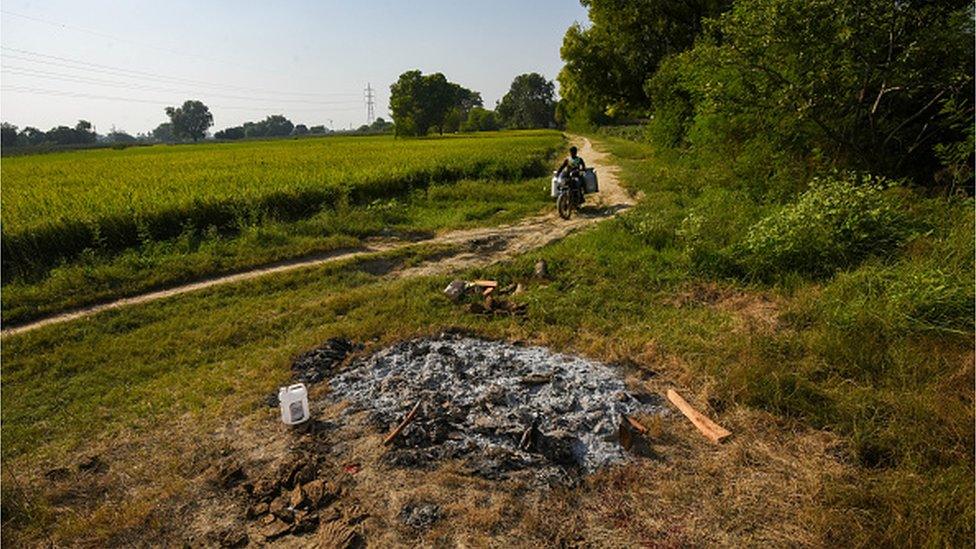
All that remains of the young woman is ash
A week after her funeral pyre lit up a dark night in Bhulgarhi village, I visited the tiny patch of farmland where the 19-year-old was cremated.
All that remains of the pretty teenager with a shy smile and long dark hair is a rectangular pile of ash.
And her family's hope for justice.
"I want to see all of them hanged," says her sister-in-law. "I am waiting for that day. She used to live with me 24 hours a day. I can't get her face out of my mind."

Read more on our coverage of the Hathras rape case:

- Published19 June 2019

- Published6 October 2020
- Published9 September 2020
